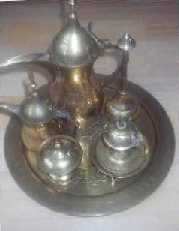
The Waswahili Community Trust UK
(Wadhamini wa Jumuiya ya Waswahili)


|
The Waswahili Community Trust UK |

|
This question can be one which demands a very long history or a very short answer depending who one is talking to and the context in which one is answering the question. We will try to be brief without making you feel that you have been short-changed by the answer.
The Swahilis are a pretty difficult people to define. This is because whenever we think of a people, we tend to think of their genetic homogeneity. Biologically, of course, there is no such thing as complete genetic homogeneity. What we are talking about at the best of times is a relative genetic homogeneity rather than an absolute one.
The degree of relativity is in part dependent upon the isolation in space and time of a given gene pool. For reasons we shall see in a moment, the Swahilis are more than a judicious mix of genetic components. So even to a Mswahili, the genetic definition of the Swahilis is not so easy to answer.
I will not go through the diverse sources of evidence which helps us to define the Swahilis. Very briefly, originally the Swahilis (or the Wa-Ngozi as they were then known) were a group of purely African occupants of the Eastern seaboard.
But by all accounts, the Swahilis (or the Wangozi) were a sea-faring people - a habit they shared with a number of Indian Ocean sea-shore inhabitants - even before the advent of Islam to Eastern Africa. Naval experts tell us that the Swahili dhow - or what we call the 'jahazi' - is quite distinct from a number of varieties of sea-going dhows from other parts of the Indian Ocean.
Sailors are not renown for genetic scruples. I am sure that many of you would have heard the old theorem that sailors keep a wife in every port! That is a euphemistic way of saying that sailors are compulsive gene distributors! We can safely say that even before the advent of Islam, dhows and monsoons were not only carriers of goods but were also effective instruments of genetic distribution at the same time.
But the advent of Islam to East Africa very early on happened more probably by virtue of trading dhows and monsoons and not by being fanned by persistently strong missionary zeal.
But by whatever means Islam came to Swahililand (which stretches from southern Somalia to the Comoros), it is generally agreed that it came very early on, and that it had a deep impact on Swahili culture and probably its international outlook at the same time.
We appeal for your donation for our charity
Comments and suggestions to improve this website
Your suggestions or concerns about our services
Please send your contributions using the form to contact us.
| Thank you Asanteni |
|---|

Copyright© March 2003: The Waswahili Community Trust (UK)
Registered Charity:1083065